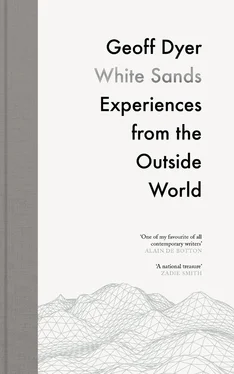76 Heidegger: Quotations are from Martin Heidegger, Basic Writings (Abingdon: Routledge, 2010), p. 248 and p. 107.
78 John Beardsley: Reprinted in Kastner, ed., Land and Environmental Art , pp. 279–80.
78 ‘It is only for their gods’: Lewis Mumford, The City in History (New York: Harcourt, 1961), p. 37.
85 ‘no bigger than’: D. H. Lawrence, ‘On Coming Home,’ in Phoenix II (Harmondsworth: Penguin, 1978), p. 255.
85 ‘the greatest experience’: D. H. Lawrence, ‘New Mexico,’ in Phoenix (Harmondsworth: Penguin, 1978), p. 142.
88 ‘some places seem temporary’: D. H. Lawrence, ‘Taos,’ in Phoenix , p. 100.
91 Smithson: Quotations are from ‘The Spiral Jetty,’ in Robert Smithson, The Collected Writings (Berkeley: University of California Press, 1996), pp. 145–47.
94 Coplans: Quoted by Ben Tufnell in Land Art (London: Tate Publishing, 2006), p. 43.
116 ‘or even if some eminent Victorians’: Annie Dillard, ‘An Expedition to the Pole,’ in Teaching a Stone to Talk (New York: Harper Perennial, 2008), p. 35.
144 ‘sun was strong’: Cf. Susan Sontag, ‘Pilgrimage,’ New Yorker , 21 Dec. 1987, p. 46.
145 A wave of émigrés: A map of the émigrés’ homes can be found at the end of Lawrence Weschler’s essay ‘Paradise: The Southern Californian Idyll of Hitler’s Cultural Exiles,’ in the catalogue Exiles + Emigrés (Los Angeles: LACMA, 1997), pp. 358–59.
145 ‘tahiti in the form of a big city’: Bertolt Brecht, Journals 1934–1955 (New York: Routledge, 1993), p. 159.
145 ‘helper, advisor and sympathetic instructor’: Thomas Mann, The Story of a Novel (New York: Knopf, 1961), p. 37.
146 ‘the disease [syphilis]’: Schoenberg quoted in Ehrhard Bahr, Weimar on the Pacific (Berkeley: University of California Press, 2007), p. 265.
146 ‘rediscovered as a long familiar element’: This and other Mann quotations in the footnote are from Mann, The Story of a Novel , pp. 40, 121, 123 respectively. Adorno’s letter to Mann is from Theodor W. Adorno and Thomas Mann, Correspondence 1943–1955 (Cambridge: Polity Press, 2006), p. 25. Mann’s letter to Erika is quoted in David Jenemann, Adorno in America (Minneapolis: University of Minnesota Press, 2007), p. 168.
146 The surprising thing: An account of Schoenberg’s meeting with Irving Thalberg, from Salka Viertel’s memoir The Kindness of Strangers , is quoted in Alex Ross, The Rest Is Noise (New York: Farrar, Straus & Giroux, 2007), pp. 295–96.
147 ‘In the afternoons’: Horkheimer quoted in Bahr, Weimar on the Pacific , p. 32.
148 ‘What enriched me’: Karl Ove Knausgaard, A Death in the Family (London: Harvill Secker, 2012), p. 295.
148 ‘He knows all my books’: Adorno quoted in interview with Calasso, Paris Review Web site.
148 ‘the most fascinating reading’: Adorno and Mann, Correspondence , p. 73.
149 ‘Dialectical thought is’: Theodor W. Adorno, Minima Moralia (London: Verso, 1978), p. 150.
149 ‘It extrapolates’: Ibid., p. 128.
149 ‘Glorification of the feminine’: Ibid., p. 96.
150 ‘Running in the street’: Ibid., p. 162.
150 ‘monuments to the hatred’: Ibid., p. 110.
150 ‘a juggler’: Ibid., p. 117.
151 ‘I could never stand him’: Klaus Mann quoted in Evelyn Juers, House of Exile (London: Allen Lane, 2011), p. 289.
152 ‘The very people’: Adorno, Minima Moralia , p. 59.
152 ‘their skin seems covered’: Ibid., p. 59.
153 Juers’s: Juers, House of Exile , p. 302.
154 ‘As far as my activities’: Theodor W. Adorno, The Culture Industry: Selected Essays on Mass Culture (London: Routledge Classics, 2001), p. 188.
154 ‘those who grill’: Ibid., p. 191.
154 ‘a stranded spiritual aristocrat’: Irving Wohlfahrt, quoted in Martin Jay, ‘Adorno in America,’ New German Critique , Winter 1984, p. 158.
154 ‘produced nothing but’: Adorno quoted in Richard Leppert, ed., introduction to Adorno: Essays on Music (Berkeley, University of California Press, 2002), p. 12.
155 ‘every visit to the cinema’: Adorno, Minima Moralia , p. 25.
155 ‘spirit of ruined’: David Thomson, The New Biographical Dictionary of Film , 6th ed. (New York: Knopf, 2014), p. 637.
155 ‘bizarre blend’: Terry Eagleton, The Ideology of the Aesthetic (Oxford: Blackwell, 1990), p. 358.
155 ‘Technology is making gestures’: Adorno, Minima Moralia , p. 40.
156 ‘driven into paradise’: Schoenberg quoted in Bahr, Weimar on the Pacific , p. 268.
156 ‘Every intellectual’: Adorno, Minima Moralia , p. 33.
156 ‘The beauty of the landscape’: Adorno quoted in Bahr, Weimar on the Pacific , p. 31.
156 ‘something of the gratitude’: Theodor W. Adorno, Prisms (Cambridge, Mass.: MIT Press, 1992), p. 8.
157 ‘seeped into life’: Adorno quoted in Jenemann, Adorno in America , p. 185.
157 ‘It is scarcely’: Adorno quoted in Jay, ‘Adorno in America,’ p. 161.
157 ‘the most advanced point’: Horkheimer quoted in Mike Davis, City of Quartz (London: Verso, 1990), p. 53.
157 ‘The exiles thought’: Ibid., p. 48.
157 ‘that reality no longer tolerates’: Adorno, Minima Moralia , p. 126.
158 ‘the waiter no longer’: Ibid., p. 117.
166 Freddy Jameson’s gloss: ‘Fleeting instants. . ’ is somewhat misquoted from Fredric Jameson, ‘T. W. Adorno,’ in Marxism and Form (Princeton: Princeton University Press, 1974), p. 8.
170 ‘humoristic complement’: Both Mann quotes are in Herbert Lehnert and Eva Wessel, eds., A Companion to the Works of Thomas Mann (Rochester, N.Y.: Camden House, 2004), p. 129.
171 ‘a zealot of seriousness’: Sontag, ‘Pilgrimage,’ New Yorker , 21 Dec. 1987, p. 54.
171 ‘I wouldn’t have minded’: Ibid., p. 48.
171 ‘magic delivered from’: Adorno, Minima Moralia , p. 222.
178 ‘something strange’: This and subsequent Mingus quotes are from Beneath the Underdog (Harmondsworth: Penguin, 1975), pp. 30–31.
184 ‘She didn’t know’: Don DeLillo, Underworld (London: Picador, 1997), p. 492.
185 ‘a kind of swirling’: Ibid., p. 277.
186 ‘the enormous weight’: Raymond Williams, Politics and Letters (London: NLB, 1979), p. 309.
186 ‘sheer material effort’: Ibid., p. 140.
187 ‘perfectly clear’: Ibid., p.142.
187 ‘Think it through’: Raymond Williams, The Country and the City (London: Hogarth Press, 1985), pp. 105–6.
192 ‘seems to have envisaged’: This and other Cécile Whiting quotes are from Pop L.A.: Art and the City in the 1960s (Berkeley: University of California Press, 2006), pp. 156, 143.
193 ‘a dream of how’: Thomas Pynchon, ‘A Journey into the Mind of Watts.’ New York Times , June 12, 1966. http://www.nytimes.com/books/97/05/18/reviews/pynchon-watts.html.
194 ‘a palace passing all imagination’: John Berger, ‘An Ideal Palace,’ in Keeping a Rendezvous (Cambridge: Granta, 1992), pp. 84–85.
196 ‘life is a state of ambition’: E. M. Cioran, The Trouble with Being Born (London: Quartet, 1993), p. 107.
196 Winogrand’s: In Peninah R. Petruck, ed., The Camera Viewed , vol. 2 (New York: Dutton, 1979), p. 127.
199 Mamet: True and False (New York: Pantheon, 1997), p. 34.
Читать дальше












